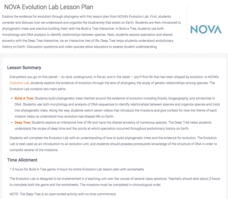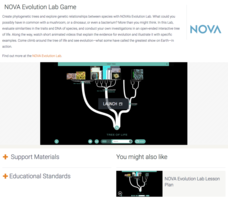PBS
NOVA Evolution Lab Lesson Plan
It doesn't matter if you look on land, in the air, underground, or in water—evolution is everywhere. Scholars complete worksheets with multiple question types as they progress through six online missions creating phylogenic trees.
PBS
NOVA Evolution Lab Game
Many scholars study phylogenetic trees without understanding how they are made. Through an online game, young scientists use the given data to create phylogenetic trees of increasing complexity. They rely on the trees they create to...
College Board
2018 AP® Biology Free-Response Questions
The average AP Biology score dropped in 2018 with the addition of more data tables and graphs. Offer additional practice free-response questions by using the questions from the 2018 AP exam covering phylogenetic trees, cell structure and...
Howard Hughes Medical Institute
Creating Phylogenetic Trees from DNA Sequences
How closely are animals related? Check their phylogenetic trees! The use of DNA sequencing altered our understanding of these relationships. Individuals explore and gain a better understanding of how scientists sort, align, and determine...
Howard Hughes Medical Institute
Skeletons Reveal Human and Chimpanzee Evolution
Ardipithecus ramidus shares features with both humans and chimpanzees. Learn about where Ardi, humans, and chimps fit in the tree of life by comparing anatomical features including the foot, pelvis, and teeth. After exploring those...
Computer Science Unplugged
Phylogenetics
Introduce your class to the concept of creating phylogenetic trees by playing a game of Telephone. Participants create a mixed-up message and through the use of distance matrices, the evolution of the message is recreated.
Curated OER
Organizing Principles of Plants and Animals
Three lessons and five assessments are contained in this material. Various paper shapes are sorted as a simulation of biological classification. Learners gather a list of living things that they are familiar with and design a...
Curated OER
Using Amino Acid Sequences to Show Evolutionary Relationships
Junior biologists compare the amino acid sequences from fragments of five different globin molecules. They count the letter differences between each species pair. They construct a graphic representation of the evolutionary relationships...
Curated OER
Tree of Life
Pupils study genetics and evolution. They evaluate a group of organisms and estimate their genetic relatedness. Then they use an online program to check the accuracy of their estimations and make a branching phylogenetic tree which...
Curated OER
Vertebrate Dioramas
Students are able to describe the development of their chosen form of vertebrate life from the past to the present in a four to six page typed paper. They explain the use of phylogenetic tree. Students use the phylogenetic tree to...
Curated OER
Vertebrate Dioramas
Students describe the development of their chosen form of vertebrate life from the past to the present in a four to six page paper. They explain the use of a phylogenetic tree, and use this to exemplify an organism's evolutionary change...
Curated OER
Embryology as Evidence of Evolution
Students observe the two major developmental pathways (protostome and deuterostome). They analyze data regarding differences in nucleotide sequences and construct a phylogenetic tree. They observe the similar evolutionary history shared...
Curated OER
An Automobile Phylogenetic Tree
Students study a list of cars and trucks and think about characteristics that can be used to show an "evolutionary relationship". From the characteristics they identity, students construct a phylogenetic tree to show how the automotive...
Curated OER
Applied Evolution: How Will We Get There from Here?
Students explore the basic process of natural selection and how people can manipulate that process today. The consequences of natural selection on daily life and the implications of evolutionary biology in basic and applied science is...
Curated OER
The Phylogenetic Tree
In this biology instructional activity, students label parts of a phylogenetic tree and differentiate between bilateral symmetry and radial symmetry.
Open Curriculum
Open Curriculum: Modern Classification Systems
Identify the four new kingdoms that were added to the original Linnaean taxonomy.


















